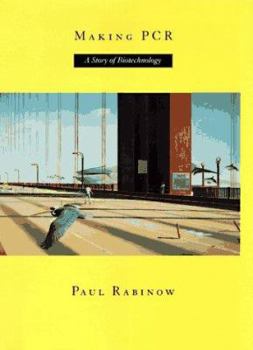Making PCR: A Story of Biotechnology
Select Format
Select Condition 
Book Overview
Making PCR is the fascinating, behind-the-scenes account of the invention of one of the most significant biotech discoveries in our time-the polymerase chain reaction. Transforming the practice and potential of molecular biology, PCR extends scientists' ability to identify and manipulate genetic materials and accurately reproduces millions of copies of a given segment in a short period of time. It makes abundant what was once scarce-the genetic material required for experimentation. Making PCR explores the culture of biotechnology as it emerged at Certus Corporation during the 1980s and focuses on its distinctive configuration of scientific, technical, social, economic, political, and legal elements, each of which had its own separate trajectory over the preceding decade. The book contains interviews with the remarkable cast of characters who made PCR, including Kary Mullin, the maverick who received the Nobel prize for "discovering" it, as well as the team of young scientists and the company's business leaders. This book shows how a contingently assembled practice emerged, composed of distinctive subjects, the site where they worked, and the object they invented. "Paul Rabinow paints a . . . picture of the process of discovery in Making PCR: A Story of Biotechnology and] teases out every possible detail. . . . Makes for an intriguing read that raises many questions about our understanding of the twisting process of discovery itself."-David Bradley, New Scientist "Rabinow's book belongs to a burgeoning genre: ethnographic studies of what scientists actually do in the lab. . . . A bold move."-Daniel Zalewski, Lingua Franca " Making PCR is] exotic territory, biomedical research, explored. . . . Rabinow describes a dance: the immigration and repatriation of scientists to and from the academic and business worlds."-Nancy Maull, New York Times Book Review
Format:Paperback
Language:English
ISBN:0226701476
ISBN13:9780226701479
Release Date:November 1997
Publisher:University of Chicago Press
Length:198 Pages
Weight:0.60 lbs.
Dimensions:0.6" x 5.5" x 8.6"
Customer Reviews
5 ratings
Basic science, biotech and life choices...
Published by Thriftbooks.com User , 17 years ago
Paul Rabinow, professor of anthropology at UC Berkeley, has scrutinized the invention and development of a major biotechnological tool that underlies most present-day gene detection and manipulation. This book tells the story of the polymerase chain reaction (PCR) on the basis of personal interviews with most of the major players as well as extensive reading of the scientific and autobiographical literature. It is really several books in one: a somewhat cerebral analysis of the ultimate meaning of science in human affairs, a historical account of the emergence of PCR, a description of the issues surrounding the rise of the biotechnology industry, and a trenchant account of the roles individual psychology and personal character play in research, especially in the industrial context. Different readers may wish to concentrate on some of these elements and gloss over the others. It's a rich tapestry of a book and I plan to return to it from time to time as one or another of its themes addresses my current interests. This book belongs on the required reading list of anyone either in or contemplating a career in biotechnology. Ditto for historians of post-WWII science.
Source of scientific discovery
Published by Thriftbooks.com User , 22 years ago
Very entertaining biographical account of the discovery of PCR, individuals, corporations, money and financial risk in biotech. Highlights the solitary, individual act of scientific discovery and how this can be decoupled from corresponding financial reward (science is not business, business is not science).
Excellent investigation of how science is REALLY conducted
Published by Thriftbooks.com User , 24 years ago
Paul Rabinow is an anthropologist who studies molecular biologists. He tells the story of the development of the polymerase chain reaction (PCR), a technique that revolutionized molecular biology. Rabinow succeeds in writing a book about science that is entertaining and informative to scientists and non-scientists alike. This book provides a first-hand examples of an unexpected revolution resulting from an unassuming research project, and the long road from concept to product. See also "French DNA" by Paul Rabinow and "The Golden Helix" by Arthur Kornberg.
An interesting look from the outside
Published by Thriftbooks.com User , 25 years ago
As a scientist (working on PCR technologies), the book was quite enjoyable, in particular the introduction in which the author has very interesting insights on the psychology of people working on scientific research, and made me pause for a "look at the mirror". The remaining of the book is a more casual reading, which nonetheless I found very interesting.
A great look at the biotech industry from the inside
Published by Thriftbooks.com User , 25 years ago
Rabinow apparently spent years observing and talking with the major players in the "discovery" or development of PCR. I disagree with the "reader from England," who apparently wants to believe that science happens in a pure vacuum. Rabinow shows how science is the product of human interactions--collaborations and antagonisms both--and how and why a lot of major research has moved from university laboratories into industrial parks. He works interviews with the scientists involved into the story, and it is a GOOD STORY that he tells. And everyone who has read Kary MUllis' autobiography should read MAKING PCR for alternative views!






